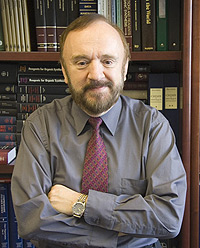Berkeleyan
Chemist to deliver year's first Faculty Research Lecture
![]()
12 March 2008
Each year, two Berkeley faculty distinguished for their scholarly research are nominated by their peers in the Academic Senate to deliver a Faculty Research Lecture during the spring. The 95th annual Faculty Research Lectures will be delivered this year by Jean M. J. Fréchet, the Henry Rapoport Professor of Organic Chemistry and a faculty member in chemical engineering, and Daniel Boyarin, the Hermann P. and Sophia Taubman Professor of Talmudic Culture in the departments of Near Eastern Studies and Rhetoric.
 Jean Fréchet (Michael Barnes photo) |
Professor Fréchet will speak on Monday, March 17, from 5 to 6 p.m. at International House. His topic will be "The Chemistry Behind Polymers: From Technology to Medicine."
Fréchet's contributions to the advancement of fundamental knowledge in organic chemistry and polymer science have been reported in more than 600 papers and formed the basis for more than 60 patents. His early work involved the first comprehensive approach to the solid-phase synthesis of oligosaccharides, followed by highly successful demonstrations of the use of polymers as reagents or catalysts in organic synthesis. This pioneering work paved the way for the recent advent of combinatorial chemistry for drug discovery. He is credited with developing the chemically amplified photoresist, the dominant imaging technology essential for today's manufacturing of semiconductor microprocessors.
In 1987, Fréchet developed a new route to dendrimers, synthetic polymers that are more versatile than proteins. Dendrimers, and other dendritic macromolecules, have emerged as a major new family of well-defined nanoscale building blocks. The globular shape of dendrimers has opened new avenues for the control of molecular architecture with vinyl and other monomers (a molecule that can be bonded to other identical molecules to form a polymer). Taking full advantage of the versatility of these macromolecules, Fréchet and his team (socrates.berkeley.edu/~jfrechet) have explored their use in a variety of applications, including fiber-optics amplifiers, highly efficient light-harvesting macromolecules, targeted drug-delivery systems, rheology control agents, enhanced adhesives, and components of phovoltaic systems.
Fréchet has also designed and demonstrated the use of several new types of separation and molecular-recognition media based on functional polymers. The new flow-through monoliths offer unparalleled performance in a broad array of applications, and have led to their commercialization for use in proteomics and in several areas of analytical and combinatorial chemistry. Related work has led to the development of a totally novel family of polymer-supported catalysts for olefin polymerization.
In recent years, he has undertaken the development of functional macromolecules for therapeutic applications. His approach to precise biocompatible dendritic carriers for the targeted delivery of anti-cancer drugs has now been licensed and is under consideration for commercial development. Related work on a novel approach to the intracellular delivery of proteins, plasmid DNA, and oligonucleotides using endosomal disruptive nanoparticles has great potential for applications in vaccines and gene therapy.
Professor Boyarin's lecture, "The Talmud as a Fat Rabbi: Bakhtin, Levinas, Talmud," will be delivered on April 1. A Berkeleyan preview of his lecture will appear prior to the event.
For information about this year's Faculty Research Lectures, visit www.urel.berkeley.edu/faculty, phone 642-3805, or e-mail ecravens@berkeley.edu.

